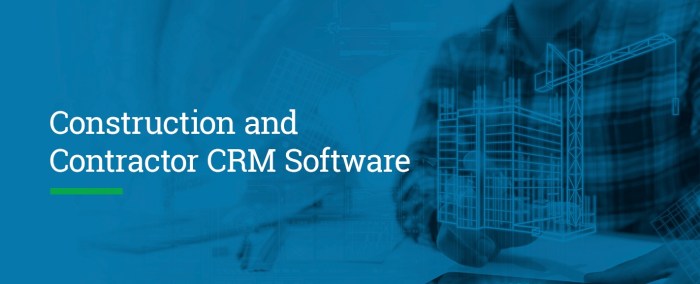Crm software for builders – The construction industry is demanding. Juggling multiple projects, managing subcontractors, tracking materials, and maintaining client relationships requires meticulous organization and efficient communication. This is where a robust Customer Relationship Management (CRM) system specifically designed for builders becomes invaluable. A well-implemented CRM can significantly improve efficiency, boost profitability, and enhance client satisfaction, ultimately leading to a more successful and less stressful business.

Source: simplesalestracking.com
Why Builders Need a Specialized CRM
Generic CRM software often lacks the specific features and functionalities crucial for the construction industry’s unique needs. A builder’s CRM needs to handle complex project timelines, manage multiple stakeholders, track intricate budgets, and facilitate seamless communication across various teams. Standard CRMs may struggle to adapt to these demands, resulting in inefficiencies and lost opportunities.
Key Features of a Builder-Centric CRM:, Crm software for builders
- Project Management Capabilities: Detailed project tracking, task assignment, milestone management, and progress monitoring are essential. The system should allow for easy visualization of project timelines and identification of potential delays.
- Contact Management: Efficiently manage client information, subcontractor details, supplier contacts, and internal team members. The system should allow for easy segmentation and targeted communication.
- Document Management: Centralized storage and access to crucial project documents, including contracts, blueprints, permits, and invoices. Version control and secure access are critical.
- Lead Management: Capture and nurture leads from various sources, track their progress through the sales funnel, and automate follow-up communication.
- Financial Management: Integrate with accounting software to track project budgets, expenses, and profitability. Generate reports on project costs and revenue.
- Communication & Collaboration Tools: Facilitate seamless communication among team members, clients, and subcontractors through integrated email, messaging, and video conferencing features.
- Reporting & Analytics: Generate insightful reports on project performance, sales trends, and customer satisfaction. Use data-driven insights to improve business strategies.
- Mobile Accessibility: Access project information and communicate with stakeholders on the go through a user-friendly mobile app.
- Integration with other tools: Seamless integration with other essential software, such as accounting software (e.g., QuickBooks, Xero), project management tools (e.g., Asana, Trello), and scheduling software.
Choosing the Right CRM for Your Construction Business
Selecting the right CRM involves careful consideration of your specific needs and budget. Factors to consider include:
Factors to Consider When Choosing a CRM:
- Scale of your business: A small construction company may need a simpler, less expensive CRM, while a larger enterprise will require a more robust and scalable solution.
- Specific features required: Prioritize the features that are most important to your business, such as project management, financial tracking, or communication tools.
- Integration capabilities: Ensure the CRM integrates seamlessly with your existing software and tools.
- User-friendliness: Choose a CRM with an intuitive interface that is easy for your team to learn and use.
- Cost and pricing model: Consider the upfront costs, ongoing subscription fees, and any additional charges for features or support.
- Customer support: Look for a provider that offers reliable and responsive customer support.
Top CRM Software Options for Builders
Several CRM platforms offer tailored solutions for construction businesses. Researching and comparing different options is crucial to find the best fit for your specific needs. Some popular choices include (Note: This is not an exhaustive list, and the best choice will depend on your specific requirements):

Source: gomarketingcrm.com
- CoConstruct: Known for its strong project management features and ease of use for construction professionals.
- Buildertrend: A comprehensive platform offering project management, client communication, and financial tracking tools.
- JobNimbus: Focuses on streamlining communication and improving team collaboration.
- ServiceTitan: A powerful platform for larger construction companies, offering extensive features and scalability.
- Salesforce (with custom configurations): While a general CRM, Salesforce can be customized to fit the needs of construction businesses through the use of appropriate apps and configurations.
Implementing and Optimizing Your CRM
Successfully implementing a CRM involves more than just choosing the right software. It requires careful planning, training, and ongoing optimization. Consider these steps:
Steps to Successful CRM Implementation:
- Data Migration: Accurately transfer existing client and project data into the new CRM system.
- Team Training: Provide comprehensive training to your team on how to use the CRM effectively.
- Process Standardization: Establish clear workflows and processes for using the CRM to ensure consistency and efficiency.
- Regular Monitoring and Optimization: Continuously monitor the CRM’s performance and make adjustments as needed to maximize its effectiveness.
- Integration with other systems: Ensure seamless data flow between your CRM and other essential software.
Frequently Asked Questions (FAQs): Crm Software For Builders
- Q: How much does CRM software for builders cost? A: The cost varies greatly depending on the features, scalability, and provider. Expect to pay anywhere from a few hundred dollars per month to several thousand, depending on the chosen plan and the number of users.
- Q: Is CRM software difficult to learn? A: Most modern CRMs are designed with user-friendliness in mind. However, some training and familiarization will be required. Choose a system with intuitive design and readily available support resources.
- Q: Can a CRM help me improve client communication? A: Absolutely! CRMs centralize communication, making it easier to track interactions, share documents, and provide timely updates to clients, leading to improved satisfaction.
- Q: Will a CRM improve my project management? A: Yes, a good CRM provides tools for project tracking, task assignment, and progress monitoring, enabling better organization and control over projects.
- Q: How long does it take to see a return on investment (ROI) from a CRM? A: The ROI varies depending on factors like implementation, usage, and the specific features utilized. Many builders see improvements in efficiency and profitability within months.
Conclusion
Investing in a CRM designed for builders is a strategic move towards increased efficiency, improved client relationships, and enhanced profitability. By carefully selecting the right software and implementing it effectively, construction businesses can streamline their operations, gain a competitive edge, and ultimately achieve greater success.
Call to Action
Ready to transform your construction business with a powerful CRM? Contact us today for a free consultation and let us help you find the perfect solution to meet your unique needs!
Frequently Asked Questions
What types of CRM software are best suited for builders?
Cloud-based CRMs offering mobile accessibility and robust project management features are generally preferred. Look for systems with customizable fields to accommodate the specific needs of the construction industry.
How much does CRM software for builders typically cost?
Pricing varies greatly depending on the features, number of users, and vendor. Expect a range from affordable monthly subscriptions to more substantial enterprise-level solutions.
What are the key features to look for in a builder’s CRM?
Essential features include contact management, lead tracking, project management tools, document storage, reporting and analytics, and ideally, integration with other business software.
How long does it take to implement a CRM system?
Implementation time depends on the complexity of the system and the size of the business. Expect a period of several weeks to a few months for complete setup and training.
